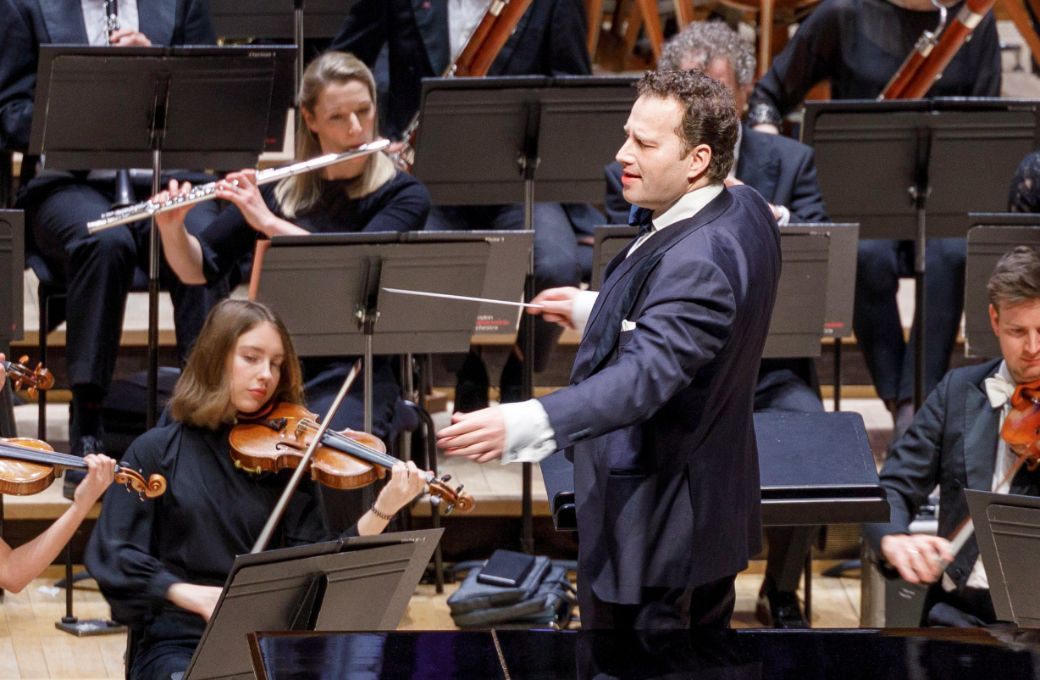Rachmaninov’s Second Piano Concerto always ensures a good house, especially with a pianist of the eminence of Kirill Gerstein. This was a good performance if not one that will be recalled as a highlight of this 150th anniversary year. There was tradition in the slowness of the opening chords, though Rachmaninov recorded them twice rather more moderato in pace as marked. Sometimes an appealing improvisatory feeling emerged – Gerstein studied jazz piano as a youngster – as in his presentation of the lyrical second subject.
He favoured the robust and powerful more than the romantic and poetic, so perhaps he was offering a revisionary view of the work, to escape those Brief Encounter movie associations. Certainly plenty of thrills (and in the finale some spills) were on offer, and a coda that brought some audience members to their feet. The encore, a transcription of Rachmaninov’s song In the Silence of the Secret Night, certainly delivered the poetry implied in its absent text.
The programme began with Glinka’s Overture to Ruslan and Lyudmila. As usual its tempo for the opening scurrying strings seemed to be more Prestissimo than the written Presto, and although the London Philharmonic Orchestra's strings coped superbly, just because you can do something doesn’t always mean you should! A slightly less frenetic speed could allow still more precision, and a more musical (as opposed to pyrotechnical) excitement. The second theme was wonderfully warm from violas, cellos and bassoons, and we could hear why, demonstrating such orchestral virtuosity in 1842, Glinka was canonised as the father of Russian music.
The father of Czech music provided the second half with his patriotic set of tone poems Má vlast (My Homeland). Or rather two thirds of that work, since as the programme slightly apologetically put it we were to hear “Má vlast (movements 1-4)”. The LPO might be banned from touring Czech cities if they dared call it “Má vlast (original version)”! But movements 1-4 were written in 1874-75 and performed as a complete work, and in 1877 Smetana wrote “I have written the tetralogy for large orchestra with the title Vlast (Vaterland)... these pieces have been performed in Prague with unexpected success... and I am persuaded to enlarge the cycle with extra movements.” So the inter-related Tábor and Blaník were additions, enlarging the size if not the stature of the original. (More than one conductor has noted that on reaching Blaník the musicians are exhausted).

Czechs can always hear all six tone poems open the Prague Spring Festival every 12th May (the date of Smetana’s death). For the rest of us, our inner Bohemian is wonderfully well served by these ideally coherent four pieces, especially so well played by the LPO. Smetana gives the strings much to do, and they relished their many lyrical passages, such as the memorable flowing theme of Vltava, which they sang joyfully as if on a summer barge on that river itself. But from the bardic opening on two harps of Vyšehrad, through the violent drama of Šárka, to the climax of From Bohemia’s Woods and Fields, the LPO relished repertoire they are too rarely asked to play.
Danish-Israeli violinist and conductor Nikolaj Szeps-Znaider was making his LPO debut as a conductor, having last played with them in 2008 as a violin soloist. He needed no score for Má vlast, and the orchestra provided some highly accomplished playing. So it is to be hoped that he will return soon – in either capacity.


